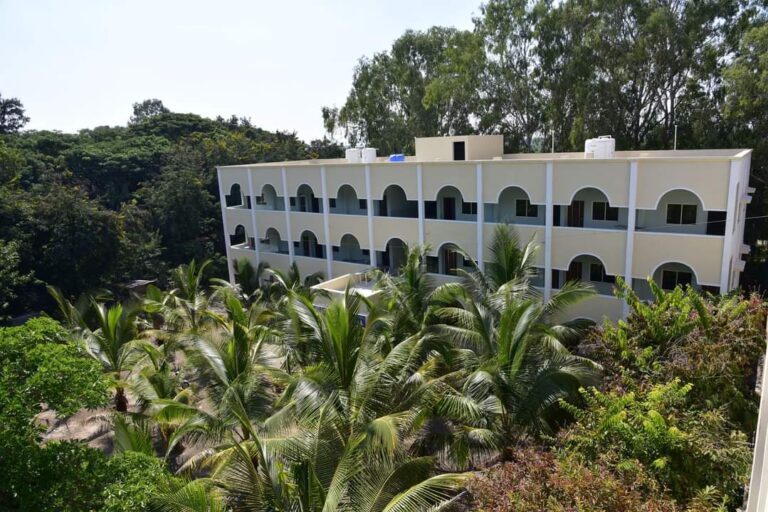“Serving society through excellence in pharmacy education for betterment of health care service.”
- M.1.To impart quality education and training in the field of pharmacy
- M.2.To contribute to the advancement of community pharmacy and public health.
- M.3.To empower young mind with value based education, communication and entrepreneurial skill.
Programme Objectives (Pos) (ER 2020)
- Review Prescriptions: The student should receive and handle prescriptions in a professional manner and be able to check for their completeness and correctness. Also, the prescribers should be contacted for any clarifications and corrections in the prescriptions with suggestions if any.
- Dispense Prescription / Non-Prescription Medicines: The student should be able to dispense the various scheduled drugs / medicines as per the implications of the Drug & Cosmetics Act and Rules thereunder. Also, the non-prescription medicines (over-the-counter drugs) should be dispensed judicially to the patients as required.
- Provide Patient Counselling / Education: The student should be able to effectively counsel / educate the patients / caretakers about the prescription / nonprescription medicines and other health related issues. Effective communication includes using both oral and written communication skills and various communication techniques.
- Hospital and Community Pharmacy Management: The student should be able to manage the drug distribution system as per the policies and guidelines of the hospital pharmacy, good community pharmacy practice and the recommendations of regulatory agencies. Also, be able to manage the procurement, inventory, and distribution of medicines in hospital / community pharmacy settings.
- Expertise on Medications: The student should be able to provide an expert opinion on medications to health care professionals on safe and effective medication-use, relevant policies and procedures based on available evidences.
- Proficiency on Pharmaceutical Formulations: The student should be able to describe the chemistry, characteristics, types, merits and demerits of both drugs and excipients used in pharmaceutical formulations based on her/his knowledge and scientific resources.
- Entrepreneurship and Leadership: The student should be able to acquire the entrepreneurial skills in the dynamic professional environments. Also, be able to achieve leadership skills through teamwork and sound decision- making skills.
- Deliver Primary and Preventive Healthcare: The student should be able to contribute to various healthcare programs of the nation including disease prevention initiatives to improve public health. Also contribute to the promotion of national health policies.
- Professional, Ethical and Legal Practice: The student should be able to deliver professional services in accordance with legal, ethical, and professional guidelines with integrity.
- Continuing Professional Development: The student should be able to recognize the gaps in the knowledge and skills in the effective delivery of professional services from time to time and be self-motivated to bridge such gaps by attending continuing professional development programs.
Program Educational Objectives (PEOs)
- PEO.1 Diploma graduate will be possess strong knowledge of pharmaceutical Science and will be competent for higher education and all operational sector of pharmacy.
- PEO.2 Diploma graduate will exhibit professional ethics, responsibilities for rendering better health care services to the Society.
- PEO.3 Diploma graduate will possess enterpreneual skills and leadership qualities to excel in professional career.

Programme Objectives (Pos) (ER 1991)
- Pharmacy Knowledge: Possess knowledge and comprehension of the core and basic knowledge associated with the profession of pharmacy.
- Modern tool usage: Learn, select, and apply appropriate methods and procedures, resources, and modern pharmacy-related computing tools with an understanding of the limitations.
- Leadership skills: Understand and consider the human reaction to change, motivation issues, leadership and team-building when planning changes required for fulfillment of practice, professional and societal responsibilities. Assume participatory roles as responsible citizens or leadership roles when appropriate to facilitate improvement in health and wellbeing.
- Professional Identity: Understand, analyze and communicate the value of their professional roles in society (e.g. health care professionals, promoters of health, educators, managers, employers, employees).
- Pharmaceutical Ethics:Honour personal values and apply ethical principles in professional and social contexts. Demonstrate behavior that recognizes cultural and personal variability in values, communication and lifestyles. Use ethical frameworks; apply ethical principles while making decisions and take responsibility for the outcomes associated with the decisions.
- Communication: Communicate effectively with the pharmacy community and with society at large, such as, being able to comprehend and write effective reports, make effective presentations and documentation, and give and receive clear instructions.
- The Pharmacist and society: Apply reasoning informed by the contextual knowledge to assess societal, health, safety and legal issues and the consequent responsibilities relevant to the professional pharmacy practice.
- Environment and sustainability: Understand the impact of the professional pharmacy solutions in societal and environmental contexts, and demonstrate the knowledge of, and need for sustainable development.
- Life-long learning: Recognize the need for, and have the preparation and ability to engage in independent and life-long learning in the broadest context of technological change. Self-assess and use feedback effectively from others to identify learning needs and to satisfy these needs on an ongoing basis.
